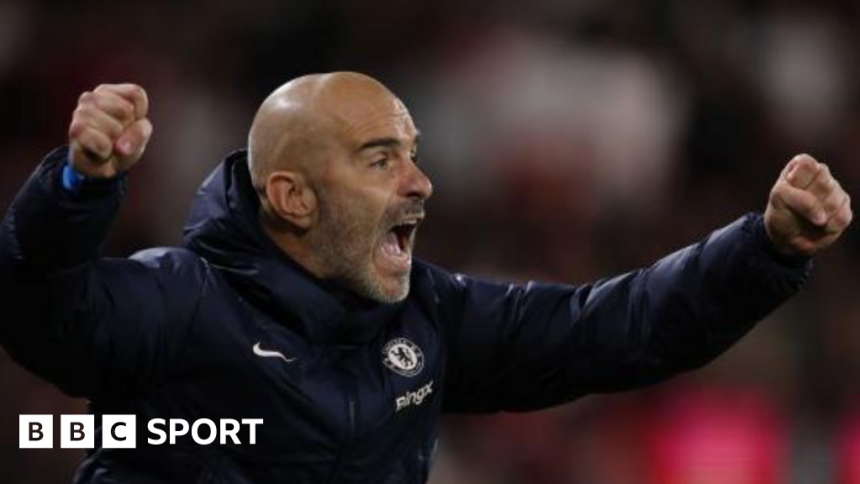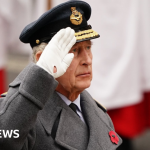‘Work in progress’ – how Maresca is turning Chelsea around

-
Published
On 29 November 2008, Enzo Maresca was Sevilla’s defensive midfielder when Pep Guardiola’s high-flying Barcelona were the visitors.
It would turn out to be a key moment in his career. A lightbulb moment of clarity, when thoughts the 28-year-old Maresca had on how the game should be played were turned on their head.
It would be more than eight years before he, as a young coach, could begin to try to put into practice what he had witnessed that night when Barca strolled to a 3-0 victory as Sevilla spent most of the game trying to figure out how to get the ball.
The die was cast; Maresca always knew that he wanted to be a coach, but now, thanks to Guardiola and that night in Seville, he knew exactly what type of coach.
Having also learned from the likes of Carlo Ancelotti, Marcello Lippi and Manuel Pellegrini as a player, Maresca enjoyed spells as an assistant manager at Ascoli, Sevilla, and West Ham – under Pellegrini.
He then joined Guardiola’s Manchester City, first transforming the fortunes of the club’s under-23s side, before returning to City as assistant manager after an ill-advised spell in Italy with second division Parma.
And after taking Leicester City back into the Premier League at the first of asking, Chelsea came calling.
He arrived as the club’s fourth manager since American investor Todd Boehly and private equity firm Clearlake Capital bought the club in May 2022, and with the new regime having spent more than £1.5bn on players.
But, amid the challenges of an oversized squad and talk of managing Chelsea being an impossible job, Maresca has earned growing plaudits for the performances on the pitch and calming the situation off it.
How and why did Chelsea go for Maresca?
Enzo Maresca’s Chelsea have only lost two of his first 10 Premier League matches in charge
Last season Chelsea witnessed Maresca’s abilities first-hand, when Leicester gave them a scare in a 4-2 FA Cup quarter-final win, but that game was just confirmation of what the club’s decision makers had already seen in him.
It was a brave decision by the Blues to part company with Mauricio Pochettino in the summer, who many felt was beginning to turn things around.
But the club felt they needed a different type of manager, one who was able to accept the club structure and a role that mostly has to do with coaching, and who would work with the policy of buying almost exclusively young players.
Maresca was asked to travel to London for an initial meeting with Chelsea’s owners, and the club’s sporting directors Paul Winstanley and Laurence Stewart.
At the time, the club were still considering the likes of Thomas Frank, Roberto de Zerbi and Kieran McKenna, but they felt they had found the right man.
Maresca brought his computer for a second meeting, but the thing that stayed with those present was his desire to work with the squad he had already studied in detail.
“I love these players,” he told them. He was very keen to manage one of the youngest squads in Premier League history.
The club was looking for a first-team coach with an attractive style, based on possession football, control and domination of the game. They wanted an energetic approach but with the ability to be flexible.
Maresca ticked all the boxes.
Chelsea were tempted to shake hands there and then, but opted to finish the selection process.
Maresca though, informed the club his immediate priority was to go on a planned family holiday in Marbella. He would take the family to Spain and travel back the next day to meet in London.
Understanding the situation and impressed by his priorities, Chelsea decided to travel to him.
With other clubs interested – including Manchester United – representatives of the London club made the journey to southern Spain to seal matters.
Once he arrived in Marbella, the owners offered Maresca a handshake before details of the contract were even finalised.
For Chelsea, it was a way of telling him they did not want an employee but a partner. They wanted the manager to buy into the concept. Maresca offered his hand, and the agreement was in place. The rest was just paperwork for others to do.
He signed a five-year deal, just 12 months after completing his first full season as a manager.
What did Maresca find at Chelsea and what is their model?
Serious decisions had to be made on his arrival, notably the selling of youth product Conor Gallagher to Atletico Madrid.
The club talked to Maresca about their intentions; he has the freedom to accept players and question club decisions.
His squad is now full of players he wanted, with the exception of one case who he accepted the club’s approval for despite not being sure about.
But with Gallagher everybody was aligned.
With just a year left on the midfielder’s contract, Chelsea and Maresca found themselves between a rock and a hard place.
If he stayed he would have to renew, but they were struggling to agree on financial demands and Chelsea were never going to allow his contract to run down. The player had to depart.
Coming the other way was Joao Felix, who returned to the Blues having spent an unsuccessful loan spell there in 2023, but on much lower wages and a seven-year deal.
“I don’t do miracles,” is one of Maresca’s favourite sayings, and you can imagine him pointing that out about a player who has struggled to fulfil their potential.
The club though, were convinced he could be useful and that Maresca’s detailed work would make him better. Eventually the coach accepted the challenge.
Felix was an exception to the rule. The Chelsea model works on the basis that their potential stars – young players with huge qualities – are paid a fixed sum plus performance-related incentives.
The new ownership say they do not want to be hamstrung by high wages as the previous regime were.
It is all about trying to build a sustainable model for the long-term that allows players who impress to be rewarded with extensions and more money, as Nicolas Jackson and Cole Palmer got in their new contracts, while allowing the club to move on those who underperform, easier to do when they are on average Premier League wages.
Enzo Fernandez, for example, was signed from Benfica in January 2023 for £107m – but on a nine-and-a-half-year contract.
The deal was certainly an upgrade on what the midfielder was earning at Benfica, but still said to be nowhere near what he could have earned elsewhere.
Chelsea’s owners say the long contracts are not given with a view to try to amortise the value of a player over a number of years, but rather to build the right model to make the club sustainable, including the shaping of a squad that can be together for years.
It does not matter how much a player costs, but they have to come with one big condition – to have the right background, character and ability to be team players.
Maresca, identified by the club to guide them for the next decade, can have any player he wants as long as they are under the age of 24 and willing to commit to the team long-term.
He wants two players for every position as a bare minimum and, with that now in place, he does not envisage signing more than two or three each transfer window.
To outsiders, one of the most impressive things Maresca has done is stabilise a squad that was seen as being hugely inflated, with talk of in excess of 45 players. The manager though has a first-team squad of 23 and that is what he has dealt with since day one.
Many clubs will have a squad of about 18 of their strongest players with the remaining numbers made of youngsters. Chelsea have added one or two more because of the schedule this season, which could see them playing 70 matches across four competitions, plus the Club World Cup.
Chelsea believe talk of an oversized squad was also exaggerated, because it included players who have suffered mid to long-term injuries, those who have been pre-signed with a view to the future and others who don’t fit into Maresca’s plan and will be moved on.
What defines him as a coach?
Maresca led Leicester to promotion to the Premier League last season
Maresca is most at home doing what he does best – coaching.
The club has a hands-on owner who likes to be part of the decision-making but respects the knowledge of the two directors of football, Winstanley and Stewart, who work closely with the manager.
The first to arrive and the last to leave each day, Maresca is working to address a culture at the club that has led many young superstars to believe their arrival at Chelsea was the fulfilment of their ambitions.
Winning over the players is paramount.
To do that he delegates his closest colleagues to analyse matches and opponents, looking for improvements, correcting mistakes and planning strategies.
People like assistant manager Willy Caballero – the former Manchester City and Chelsea goalkeeper – and coaches Danny Walker and Roberto Vitiello, fitness coach Marcos Alvarez, analyst Javi Molina and goalkeeper coach Michele de Bernardin.
Chelsea currently have two goalkeeping coaches.
Maresca brought De Bernardin with him even after he was told they already had Henrique Hilario. He was clear he would not come if De Bernardin could not come. He wants his people around him because he believes it makes his decisions better.
You can count on one hand the players he has in the dressing room who have won major titles at European or world level.
It is a work in progress. Maresca knows he has to build a new set of coaching habits, new routines, and needs people he has worked with to help him create them.
It is part of his plan to make Chelsea players stop thinking about positions and consider playing in a wider, less regimented and fluid way.
Maresca has already had to rise to challenges that do not have to do with tactics.
He could have done without the Fernandez controversy during pre-season, when the midfielder posted a video on social media showing him and his Argentina team-mates in a racist and discriminatory chant questioning the heritage of France’s black and mixed-race players.
It certainly did not sit well with the many French black and mixed-race players in the Chelsea squad, and could have derailed team spirit before the season had even started.
Fernandez acknowledged the mistake he had made when he spoke with his coach on the phone. He was worried about what the reaction of his team-mates would be when he joined them on a pre-season tour of America.
Most importantly he did not try to justify what he had done, accepting straight away his mistake in front of his team-mates in a hotel room where the club were staying.
So for the time being things are heading in the right direction, and confidence is high from the boardroom all the way down.
Maresca crossed paths with one of his oldest mentors, Real Madrid manager Carlo Ancelotti, when Chelsea played them in pre-season.
His fellow Italian greeted him with an idiom meaning “now it is all serious stuff, mate”. Maresca laughed.
Ancelotti whispered in his ear: “Drop your defence back about 10 yards and you should have fun this year.”
Maresca told him that it was a legacy of the past, and that things would be corrected to fit his ideas and style.
And making the team his is exactly the work he has been doing.
As for the success of the long-term vision? Only time will tell.
Related topics
-
-
Published26 July 2022
-







